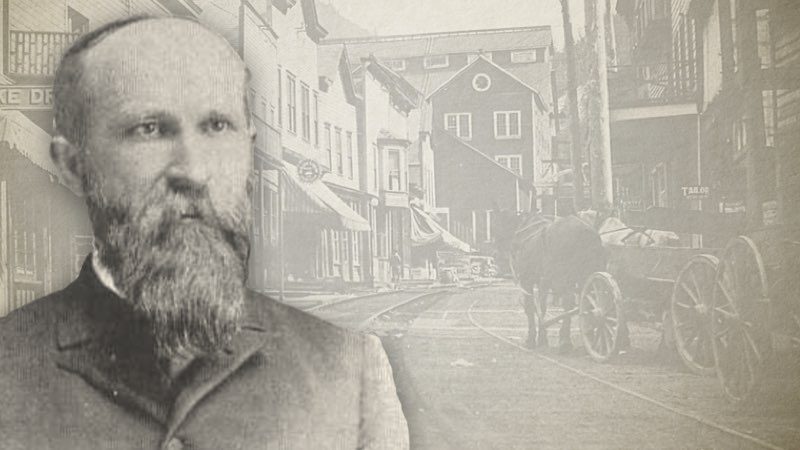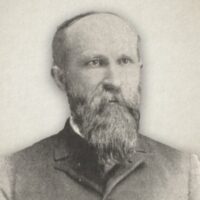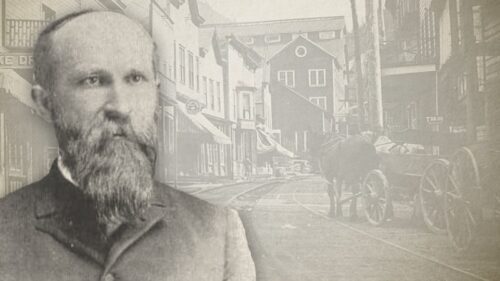
Chapter 2: The Significance of Baptism
The advent of John the Baptist into the world was not an unexpected event. Although his birth had not been announced by angels, as was Christ’s, yet God had declared, “I will send my messenger and he shall prepare the way before me.”—Mai. 3:1. “Behold, I will send you Elijah the prophet before the coming of the great and dreadful day of the Lord: and he shall turn the heart of the fathers to the children, and the children to their fathers, lest I come and smite the earth with a curse.”—Mai.4:5,6. Jesus declared that it was John of whom this was written. —Matt. 11:10. He also testified that Elias (Elijah) must first come, but declared that he had already come, and they knew him not.—Matt. 17:11,12.
We know but little of John’s early life. So important a personage, under ordinary circumstances, would have attracted the attention of the whole world. He came, however, to herald one who was “mightier than he, the latchet of whose shoes he was not worthy to unloose.” In the presence of the great Light which followed him he was speedily forgotten. He came as God’s chosen messenger. No priest could induct him into office, for there was none higher than he. “Verily I say unto you, there hath not risen a greater than John the Baptist.”—Matt. 11:11. His utterances were the utterances of heaven.—Luke 3:2. His deeds were the deeds of God. In answer to the question, “Who art thou?” he replied, “I am the voice of one crying in the wilderness.”—John 1:23.
A new light had burst upon a sin cursed world. A new era had dawned. Another kingdom was about to be ushered in. While many prophets had foretold Christ’s coming, none lived to see him except John. It was his privilege to announce Christ’s presence. He taught the people that Christ was at hand, but he was not yet permitted to point him out. He did not know Jesus as the Christ, nor would he, until God should make him known by the visible presence of the Holy Spirit.—John 1:33. “When the Jews sent priests and Levites from Jerusalem to ask him, “Who art thou? And he confessed, and denied not, but confessed, I am not the Christ.”—John 1:19,20. He declared himself the voice of one crying in the wilderness, who had come to prepare the way of the Lord, and that the Christ stood among them, i.e., lived among them, and they knew him not.
John’s mission was to make ready a people to receive Christ when he did appear. God had sent him to do this very thing; he was therefore more than a prophet. It was God acting in and through him, as if God did this work himself. He said, “I am the voice,” and ‘’God sent me to baptize.’’ It was necessary that there be a people formally prepared to receive Christ. “Prepare ye the way of the Lord.” That is, make ready a people to receive him. Let them reflect the way or likeness of Christ.
No one could thus make ready a people to receive the coming One, without first being commissioned to do so. No earthly power had the right to give this commission. Hence John’s was from heaven.—John 1:6.
The preparation for discipleship consisted in two acts, an internal, and an external, or formal one:
1. The internal preparation consisted in repentance and faith in him who was to come, that is, in Christ. Great numbers came to John and were baptized of him in Jordan, confessing their sins.
We have no account of any having been baptized by him who did not repent and make confession, nor is there any reason to believe that any such were baptized, for when some persons came to him and wished to be baptized without this, he refused, and told them to “bring forth fruits meet for repentance,” that is, produce evidence, for now the “axe is laid at the root of the tree.” God searches the heart, for “with the heart man believeth unto righteousness.” “Every tree that bringeth not forth good fruit is hewn down,” so every one who gives no evidence of righteousness is rejected.
2. To all who produced the evidence, he administered the rite of baptism, which was the formal condition, or preparation for membership in the kingdom of Christ.
Heretofore John had been preaching in all the country about Jordan, (Luke 3:3.), but he now moves to the river, in order that he may administer the ordinance of baptism, for God sent him to baptize as well as to preach repentance and faith.—John 1:33.
We know not how many were baptized by John, but large numbers were, and it is very evident that all who accepted his teaching were baptized, for we read that “all the people that heard him, and the publicans, justified God, being baptized with the baptism of John. But the Pharisees and the lawyers rejected the counsel of God against themselves, being not baptized of him.”—Luke 7:29,30. Evidently the word all refers only to those who heard in the sense of acceptance, for it is distinctly stated that the Pharisees and lawyers rejected the counsel of God, i.e., did not receive the teaching of John, and consequently were not baptized. It follows, therefore, as a consequence, that all of John’s disciples were baptized upon a profession of their faith in him who was to come after him, that is in Christ.
John evidently made no effort to organize a church. His was a work of preparation for that which was to follow, and he was content with simply this. If it had been in the power of any man to found, or establish a church, it certainly would have been the prerogative of John, for he was “a man sent from God.” John, however, shrank from performing any other work than that which he was commissioned to do. The people pressed upon him, and the publicans, when they had been baptized, and the soldiers asked him, saying, “What shall we do?”—Luke 3:10-12.
They were evidently in “expectation” of something more, (see ver. 15,) but John “exhorted and preached unto them,” and kept them in waiting for Him whom he announced. Thus the people were ready, waiting for their lawgiver.
John had been engaged in his public ministry about six months when Jesus came from Galilee, to be baptized of him. Galilee is distant from Jordan, where John was baptizing, about forty miles, and Jesus came all the way hence in order that he might be baptized at the hands of John, as a necessary duty before entering upon his public ministry, for we are told that he “came to be baptized.” To him it was a matter of much importance. Nor did he assume to appoint some one to administer baptism to him. He must be baptized at the hands of heaven’s appointed administrator. Yet this was the Son of God! Let those who think lightly of proper authority to baptize, think of this. “Let our Lord’s submitting to baptism teach us a holy exactness in the observance of these institutions which owe their obligation merely to a divine command. Surely thus it becometh all his followers to fulfill all righteousness.”— Wesley, on Matt. 3:16.
John was evidently expecting a manifestation of the Christ to him, (see John 1:33,) but it seems that he was not expecting to administer baptism to a personage of such distinction, and when Jesus asked to be baptized, he said, “I have need to be baptized of thee.” He recognized in this obedient subject, the Son of God. Jesus answered “Suffer it to be so now, for thus it becometh us to fulfill all righteousness.”
In this manner it became Christ to set the example of obedience. And behold! while he came straightway out of the water, the visible presence of the Holy Spirit descended like a dove, and while it remained upon his head the voice of God was heard saying, “This is my beloved Son in whom I am well pleased.”
Not since the day when God’s presence was seen in the burning bush, and when he spoke face to face with Moses, had his presence been so manifested upon the earth. He spoke now in the approving accents of love and peace. Almost in a spirit of bewilderment the herald exclaimed, “Behold the Lamb of God!” “Again the next day after, John stood, with two of his disciples; and looking upon Jesus as he walked, he saith, Behold the Lamb of God! and the two disciples heard him speak, and they followed Jesus.”—John 1:35.
Author of the “Compendium Of Baptist History”. Please inform the Editor of the AHB (via the Contact page) if you have biographical information on this author. Thank you.
Shackelford on Baptist History (Complete)




